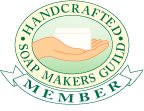As soap makers we are seeing a trend shift in the market. More and more consumers are becoming leery of the chemicals and fillers from their store and salon bought shampoos and conditioners. Mom has been making a shampoo bar for years now and I have been using it on my son since she started making it. It has worked wonders for him and almost eliminated his cradle cap without all the yucky treatments we had been using on him from birth. I was her biggest advocate for using it on children but I had never actually used it on myself and was afraid to answer questions from clients for use on their own hair... so I decided that it was time to give it a try on myself! I kept notes over the course of the first 6 weeks of my trial and I thought I would share with you the results of my experiment!
Week 1: I tucked my very expensive salon shampoo and conditioner into a cupboard for the duration of the trial... just in case! I washed my hair every second day this week with the shampoo bar with terrible results. My hair felt like I had been washing it with used fryer grease.
Week 2: I did some more research into what others have tried and gave it a go! I made up a paste of vinegar (any type will work) and baking soda. I massaged that through my hair and let it sit for a few minutes and rinsed it out. I washed it again with the shampoo bar. I was slightly dry this time, but that was definitely a step up from slimy! I also made up a vinegar rinse (2 tbsp vinegar to 2 cups water and several drops of Lavender EO) and put into a spray bottle. I spritzed my hair after every wash with the vinegar blend, let it sit for a minute and rinsed it out.
Week 3: I noticed that vinegar was a bit drying so I opted to use it every second washing and my hair was feeling much better this week!
Week 4: My hair was beginning to feel really good this week.... I have worked out the kinks and my hair has very little flyaway and I even started using less styling product on it with great results!
Week 5: I had started to notice by this week that my hair wasn't falling out nearly as much or coming out in clumps on my brush! My hair has started looking much shinier than it has in years, even when it had been freshly colored.
Week 6: I poured my expensive salon brand shampoo and conditioner down the drain... It took a few weeks for my hair to adjust to a point that I was happy, but I think the results speak for themselves!
SHAMPOO bar newbie??
- When you first start using a shampoo bar don't be surprised if you have 'bad hair day' syndrome. Your hair might be fly-away or look and feel slightly greasy... This is just temporary, we promise! You may want to prep your hair by creating a paste of vinegar and baking soda, massage it into your hair, let sit for a few minutes and rinse. This seems to help strip your hair of a lot of the shampoo residue and reduce the greasy feeling you may experience when switching from shampoo to a shampoo bar.
- Commercial shampoos & conditioners leave behind a coating on your hair. It might take a few days for the shampoo bar to strip off these excess conditioners.
- Thoroughly drench hair... to soaking wet. The wetter the better... it makes it much easier to work the shampoo through your hair.
- Rub the bar into a lather in your hands and then apply the lather directly, alternately the bar can be rubbed directly onto the scalp but I find this much harder to get a good lather! Massage lather into scalp... using only your finger tips and work suds to ends of hair.
- If your hair is long, curly or textured, I strongly recommend that you DO NOT pile hair on top of your head. This can be a recipe for an intense tangling disaster
- Finally... RINSE, RINSE and RINSE again! At this point you can rinse with a vinegar solution or use a natural conditioner if needed. Work this mixture through really well and rinse, rinse, rinse. We promise you won't smell like a pickle... just clean and fresh. We like to recommend that you rinse your hair with a mixture of vinegar & water and your favorite essential oil (we use 1 tbsp vinegar to every cup of water and put into a spray bottle) after every 2nd shampoo.
Please Note: Shampoo bars aren't recommended for use with really hard water. The minerals in the water bind with the suds and make them impossible to rinse off cleanly.
BENEFITS of shampoo bars:
- Natural bars don't strip your hair like shampoo or leave a coating behind
- There are no added chemicals and fillers
- Hair feels thicker
- May eliminate any need for a separate conditioner
- May lessen scalp and hairline irritation
- May help lessen scalp dryness
- Convenient for travel













